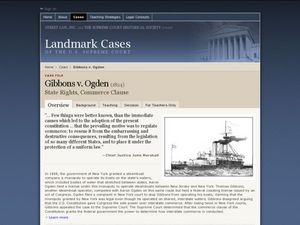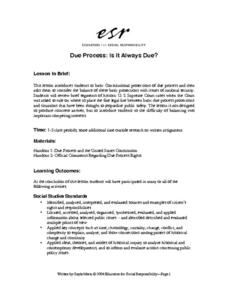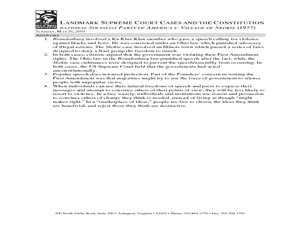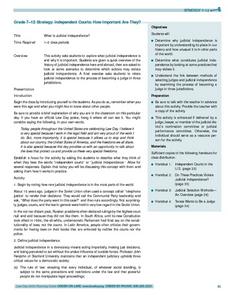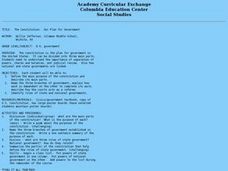Curated OER
Dred Scott v. Sandford
Young scholars examine the issues of slavery and due process. In this Supreme Court lesson, students examine primary documents from Dred Scott v. Sandford and discuss the implications of the decision.
Curated OER
Bill Of Rights
Students examine Supreme Court cases. In this U.S. government lesson, students watch a video about the Bill of Rights and then research 4 Supreme Court cases using the noted web site. Students analyze the presented information and write...
Curated OER
The Race to Learn
Students explore the history of education and race in the United States. By researching Supreme Court cases dealing with race and education, students examine the ways in which these cases have reflected changing social and cultural norms.
Curated OER
Decisions, Decisions...
Young scholars explore some of the top Supreme Court cases of the 1998-1999 term, assessing the issues behind these cases and the potential impact of the decisions made by the Court. Small groups closely examine one of this term's...
Curated OER
Mixed Blessings
Students investigate the recent federal appeals court decision finding the Pledge of Allegiance unconstitutional. They further investigate the notions of constitutionality and separation between church and state by analyzing a patriotic...
Curated OER
Will the Supreme Court Vouch for Vouchers?
Students investigate past Supreme Court decisions that have centered on education issues and assess the ways in which those decisions have impacted American education. They consider the controversies surrounding the issue of school...
Curated OER
Gibbons v. Ogden (1824)
Students examine state rights and the commerce clause. For this Supreme Court lesson, students examine primary documents from Gibbons v. Ogden and discuss the implications of the decision.
Curated OER
Mapp v. Ohio (1961)
Students examine warrantless searches and due process. For this Supreme Court lesson, students examine primary documents from Mapp v. Ohio and discuss the implications of the decision.
Curated OER
Making the Supreme Court Matter to Teens
Here are lessons and ideas to help social studies teachers enlighten students about the importance of the Supreme Court.
Curated OER
What is Congress?
In this Congress activity, students read a passage about the U.S. Congress, then complete 4 multiple choice questions. An answer key is included.
Curated OER
The Impact of Hazelwood on School Publications
Ninth graders explore the Supreme Court Case Hazelwood School District v. Kuhlmeier. In this American Government lesson, 9th graders research the recent history of censorship and how the courts have been involved in either protecting or...
Curated OER
Constitutional Rights Of Students
Twelfth graders brief Supreme Court cases about student rights that they have studied over the past year, and apply them to a contemporary situation.
Curated OER
New Jersey v. T.L.O. (1985)
Young scholars examine student search and seizure. In this Supreme Court lesson plan, students examine primary documents from New Jersey v. T.L.O. and discuss the implications of the decision.
Curated OER
Just how broken is the Senate?
Twelfth graders examine the role of the Senate in the United States. In this American Government lesson plan, 12th graders read various articles and answer questions to these articles. Students write a letter to their Senator on a...
Curated OER
Bench-Pressing Issues
Students examine some of the issues that may be facing the changing United States Supreme Court. With further exploration, they formulate their own opinions and deepen their awareness of these critical topics.
Curated OER
Due Process: Is It Always Due?
Students explore the basic Constitutional protections of due process and then consider the balance of these basic protections with issues of national security. A variety of segments of U.S. Supreme Court cases are examined in this...
Curated OER
Selecting a Chief Justice For The United States Supreme Court: The Senate Confirmation Hearings of Judge John Roberts, Jr.
Students review the procedures for selecting a new Supreme Court Justice. In groups, they determine which questions the nominee should be asked and practice asking the questions with a classmate. They watch the confirmation hearings...
Curated OER
Moot Court
Learners research and discuss court cases in preparation for Moot Court. Student attorneys research precedents involving their cases, while student justices research political ideology of Supreme Court Justices. Student attorneys then...
Curated OER
The Supreme Court
Students examine the Fourteenth Amendment. In this Supreme Court lesson, students define due process and equal protection as they analyze the impact of the amendment and the Supreme Court on workers' rights in the early 20th century....
Curated OER
Landmark Supreme Court Cases and the Constitution: National Socialist Party of America v. Village of Skokie (1977)
Students examine the impact of court decisions. For this Supreme Court lesson, students read the National Socialist Party of America v. Village of Skokie (1977) case study regarding First Amendment Rights. Students take notes on the case...
Curated OER
Landmark Supreme Court Cases and the Constitution: Reynolds v. United States (1878)
Students examine the impact of court decisions. In this Supreme Court instructional activity, students read the Reynolds v. United States (1878) case study regarding first election decided by the House of Representatives. Students...
Curated OER
Independent Courts: How Important Are They?
High schoolers investigate the importance of judicial independence and how it is exercised while conducting research to gather information using different resources. The teacher discusses the importance of Law Day. They also read the...
Curated OER
How Did That Get There?
Students evaluate the role of government in addressing land use and other environmental issues. They analyze the powers, responsibilities, and limitations of elected and appointed officials in the national legislative, executive, and...
Curated OER
The Constitution: Our Plan for Government
Students investigate the importance of separation of powers, checks, balances, and judicial review. They also investigate how national and state governments are linked.








